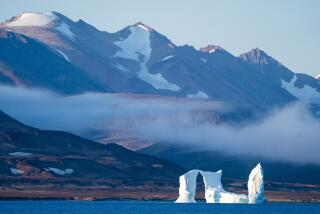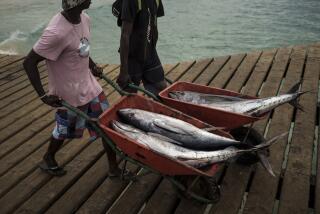With ice melting, U.S. pushes for limits on fishing in Arctic Ocean
- Share via
SEATTLE — U.S. officials are heading to Greenland for a three-day meeting to persuade other Arctic nations to place a moratorium on high-seas fishing in the Arctic Ocean, where climate change is melting the permanent ice cap and allowing trawlers in for the first time in human history.
The United States is proposing an agreement “that would close the international waters of the Arctic Ocean to commercial fishing until there is a good scientific foundation on which to base management of any potential fishing,” said David Benton, a member of the U.S. Arctic Research Commission, who will be part of the negotiations in Nuuk, Greenland.
The first step toward protecting the Arctic Ocean and its fish population, which has never been studied, is for the five nations bordering the body of water to reach an agreement on a moratorium. To date, the United States, Canada and Greenland are on board, but Russia and Norway have not joined in.
All coastal countries control the fisheries within 200 miles of their own coastlines. The high seas beyond that zone do not belong to any nation, are not covered by any regulations and can only be protected by international agreement.
Once the five Arctic nations are in accord on a fishing moratorium, Benton said, they would then reach out to other countries with major commercial fishing fleets, such as China, Japan and Korea, to negotiate full protection for the central Arctic Ocean.
Benton, who advises the U.S. negotiating team, said he was “cautiously optimistic” that the Arctic nations would reach agreement during the three-day meeting, which begins Monday.
“The Arctic is experiencing a fairly rapid rate of change,” said Benton, as the permanent ice melts. “That’s potentially causing large changes in the ecosystem, but we don’t understand what’s going on up there. If we want to do things right, this is the approach we should be taking.”
In 2009, the United States adopted its own Arctic Fishery Management Plan, closing American waters north of Alaska to commercial fishing until scientific research proves that the fishery is sustainable.
“What the United States did in its waters was a precautionary action that takes into account how Arctic warming is changing the ecosystem faster than science can keep up with it,” said Scott Highleyman, director of the international Arctic program for the Pew Charitable Trusts.
“There are no stock surveys or scientific assessments for fish there,” Highleyman said. “You don’t want to fish a place where you don’t know the fish population dynamics. Any time we’ve done that, it led to catastrophic overfishing.”
One example, Highleyman said, is the New England Atlantic cod fishery, which was shut down in the 1980s due to overfishing, costing 50,000 jobs.
There is much at stake in the central Arctic Ocean, of which about 1.1 million square miles are largely unregulated international waters. An open letter to the Arctic governments, signed by 2,000 scientists from around the world, notes the mysterious and fragile nature of the region.
If it is overfished, the scientists say, that will affect seals, whales and polar bears as well as the people who make the harsh region their home and rely on such creatures to feed their families.
“Until recently, the region has been covered with sea ice throughout the year, creating a physical barrier to the fisheries,” the scientists wrote. “In recent summers, however, the loss of permanent sea ice has left open water in as much as 40% of these international waters .… A commercial fishery in the central Arctic Ocean is now possible and feasible.”
Follow LATimes National on Facebook
ALSO:
Wary Arizona businesses urge veto of anti-gay bill
Second North Carolina coal ash spill plugged, but concerns remain
Fraternity expels 3 linked to statue noose, suspends Ole Miss chapter
More to Read
Sign up for Essential California
The most important California stories and recommendations in your inbox every morning.
You may occasionally receive promotional content from the Los Angeles Times.










